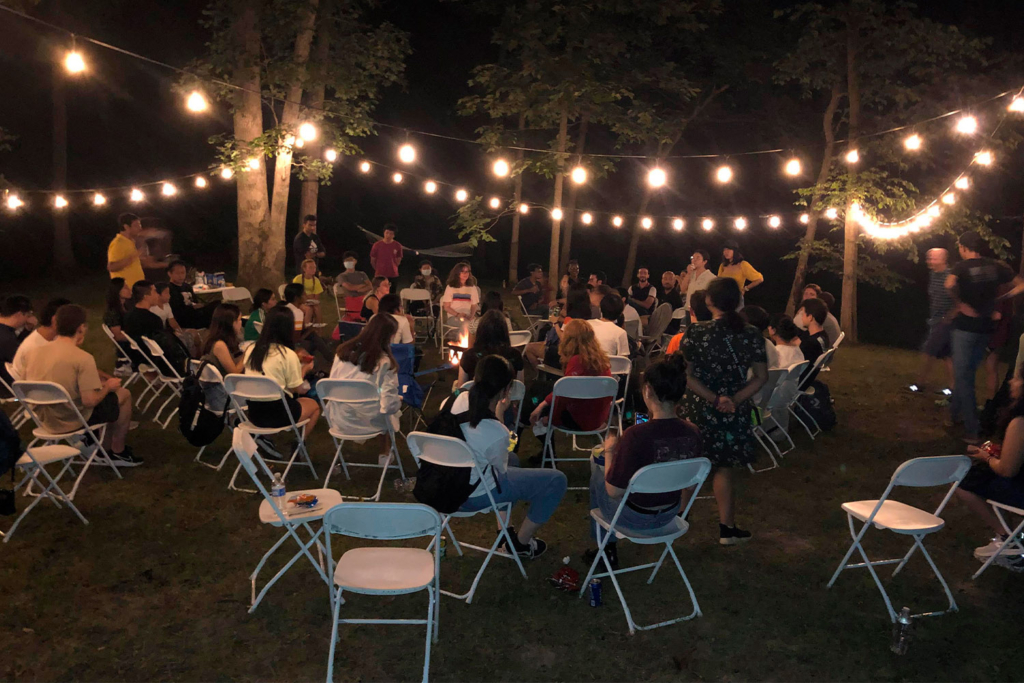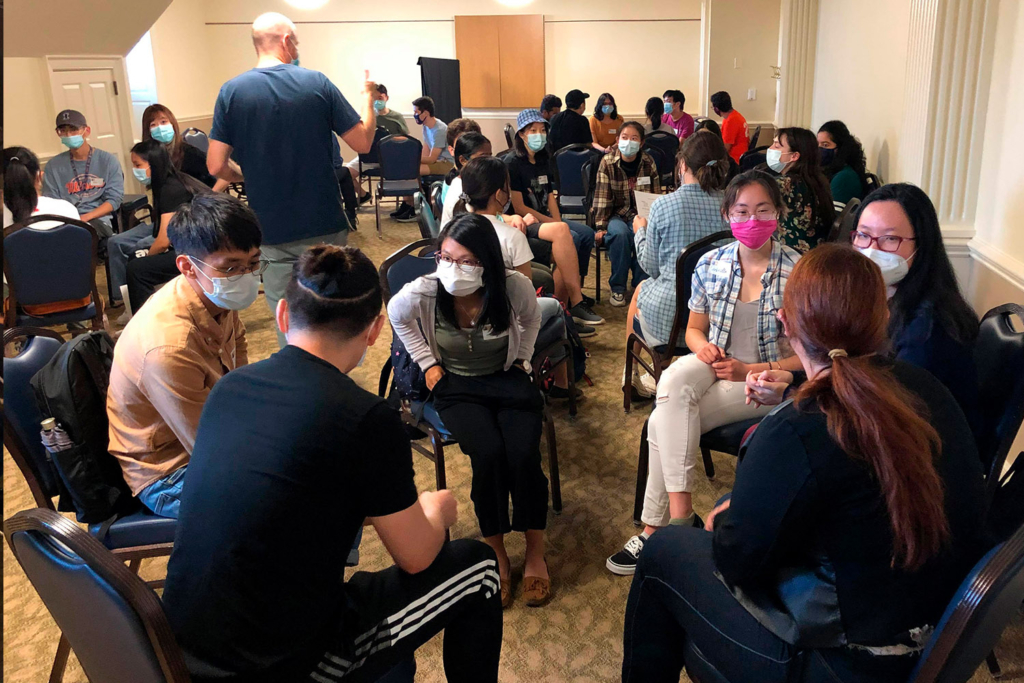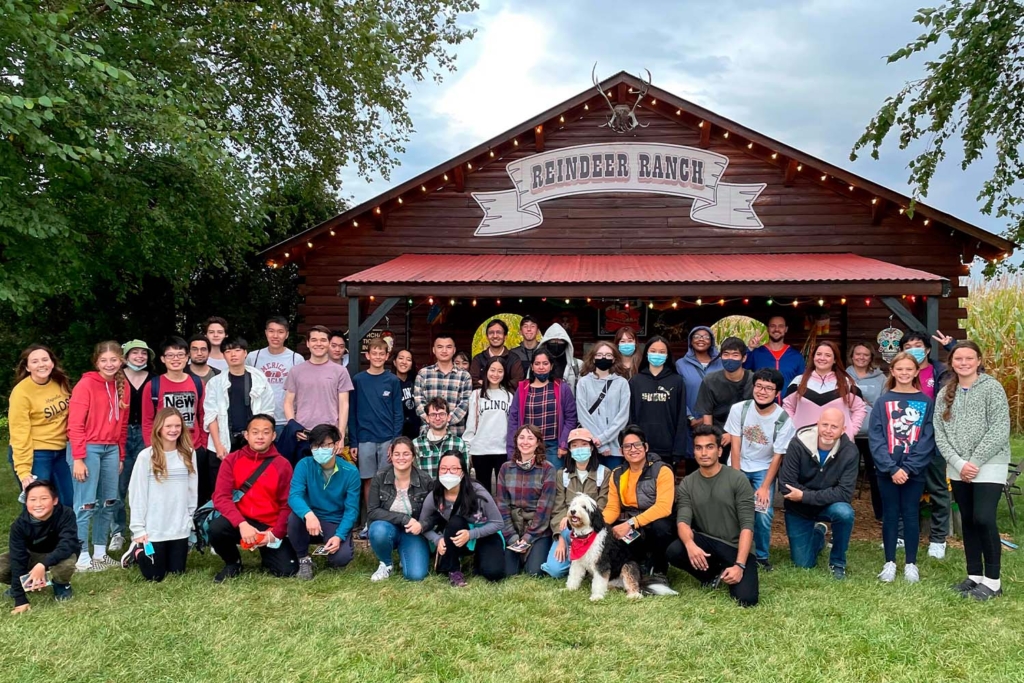Are you an international student who wants to improve your English-speaking skills? Look no further than English Corner, UIUC’s registered student organization dedicated to helping international students practice speaking English, find friendships, and learn about American culture. We sat down with Jenni, English Corner’s president, and talked about how she got involved as a native English speaker and what makes English Corner a special place to be.

Tell us a little about English Corner.
“English Corner is a place for international students, as well as other international members of our community, to come and learn about American culture and practice English, but in a very comfortable setting. We have informal discussion; we have fun activities and games. It’s really just a safe place for international students and other members of the international community here to learn about American culture and make friends.”
How did you get involved in English Corner, and what is your role in the organization?
“I’ve been a part of English Corner since freshman year. It was the first RSO I joined, and it’s the only one I’ve stayed in. … I came into the university undeclared. I [knew] I was interested in studying English, but I also really liked studying other cultures. I was in a general studies exploratory course, where we were required to join an RSO. So I went on the involved platform, and I literally just googled ‘English,’ and the first RSO that popped up was English Corner. And I thought, ‘This is perfect.’”
“I’m currently a senior, so this is my fourth year in it. The first year I joined I was a member, then the second year I served as the treasurer. And then for these past [two] years, I’ve been the president.”

What happens at a typical weekly meeting?
“In our weekly meetings on Thursday nights, we cover a variety of topics about American culture. For example, it can be how to make friends in America or American slang terms that a lot of people use. So, we’ll come as a large group, and we’ll introduce our topic, and then we’ll break into small groups. We discuss the topic, we ask students if [they] have any questions, or if there are any particulars that they’re interested in about that topic. And then we usually have some type of game. … So, we try to do discussions [so] people can ask questions, but we also try to always have a fun activity toward the end.”
Do you have a mix of native speakers and non-native speakers?
“Yes, we do. Most of our members are non-native speakers, because they’re mostly international students. We’ll place one American or native English-speaking person in each group. So, we’ll maybe have five [or] six native English-speaking volunteers who are running the small groups with international students.”
Is the experience different for joining as a native speaker versus a non-native speaker?
“I wouldn’t say so. Because really, anyone can just show up. You can be a domestic student, an international student, or an international member of the community who is not affiliated with the university. It’s really open to everyone, and you don’t have to sign up or make a commitment.”
What native languages or countries are frequently represented in English Corner?
“We definitely have people from everywhere, like every continent. We have a lot of people from East Asia, from China, Japan, sometimes from Korea. We also have people from South America—so Brazil, Argentina. We have people from Europe, maybe the UK or Germany, and then people from South Asia, like India, and the Middle East—so Turkey, Saudi Arabia. I’ve really met people from almost everywhere.”
Why do you think it is that people are interested in practicing English in a larger group setting, as opposed to a one-on-one setting? What makes that different?
“One-on-one can kind of feel like you’re getting tutored, a forced learning experience, whereas I think English Corner is a lot more of a natural learning experience where you’re with other people that are doing the same thing as you. It doesn’t feel as intimidating. No one’s really putting you on the spot where you have to speak. If you want to come and just listen, you can do that, too. It’s really up to you how much you want to participate and what you want to get out of it.”
“And I think it’s way easier to learn English as a casual conversation because textbook English can be different. I think that [through] those informal and casual conversations, people say it makes it easier to learn that way.”

What other events does English Corner have besides weekly meetings?
“We do seasonal events. So aside from those weekly meetings, especially in the fall, we go to a corn maze, and we go to the apple orchard. Those kinds of outings attract the most people because they’re just fun. And you can really start forming relationships with other people at English Corner. The biggest one is a cookout that we have at the beginning of the semester. We bring everyone to our advisor’s home to have a barbecue and a bonfire to kind of get the American experience of that. I think that’s our most attended event of the semester, actually.”
What is it about English Corner that’s kept you so engaged? Why have you continued to come back for four years?
“I definitely think it’s a break from the responsibilities that college usually gives you. It doesn’t feel like work or an obligation, it feels like somewhere you go when you really just want to relax, have social interaction outside of formal environments like classrooms. And honestly, I’ve made [so many] friends since I’ve been here. Sometimes it’s sad, because the friends leave, and they go back to their country, but that’s another main thing, why I keep going, because I keep making friends.”
“I also minor in East Asian languages and cultures, and I’m studying Chinese and Korean, so I am able to meet people that I can do language exchange with. I love the people who run it, too, the advisors. So, I think the people are the reason why I keep going.”
What would you say to someone who wants to join English Corner but feels nervous?
“I think English Corner is one of the most accepting and welcoming safe spaces that I’ve experienced while I’ve been here… [so] I would just tell them not to be nervous. When you come, you’re going to be welcomed.”